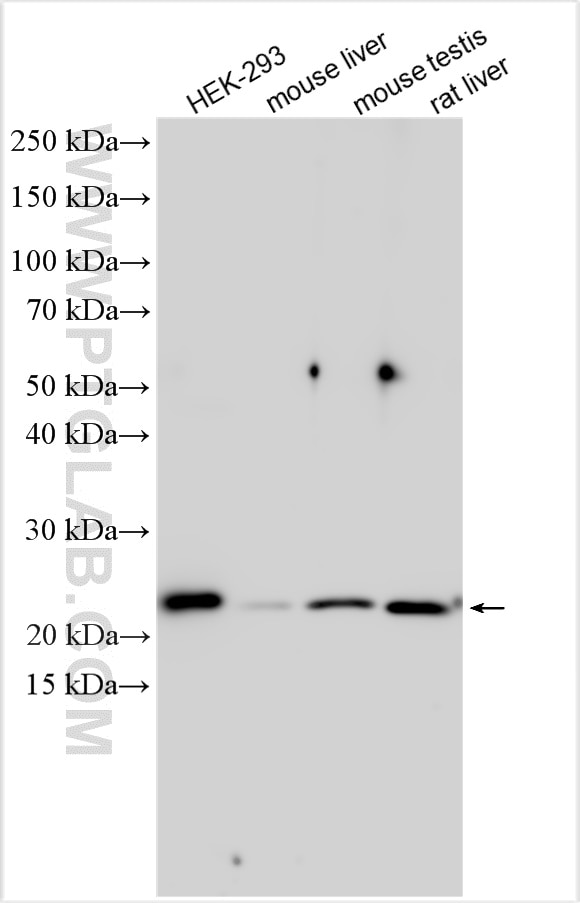CARHSP1 Polyklonaler Antikörper
CARHSP1 Polyklonal Antikörper für WB, ELISA
Wirt / Isotyp
Kaninchen / IgG
Getestete Reaktivität
human, Maus, Ratte
Anwendung
WB, ELISA
Konjugation
Unkonjugiert
Kat-Nr. : 11672-1-AP
Synonyme
Galerie der Validierungsdaten
Geprüfte Anwendungen
| Erfolgreiche Detektion in WB | HEK-293-Zellen, Maushodengewebe, Mauslebergewebe, Rattenlebergewebe |
Empfohlene Verdünnung
| Anwendung | Verdünnung |
|---|---|
| Western Blot (WB) | WB : 1:500-1:3000 |
| It is recommended that this reagent should be titrated in each testing system to obtain optimal results. | |
| Sample-dependent, check data in validation data gallery | |
Produktinformation
11672-1-AP bindet in WB, ELISA CARHSP1 und zeigt Reaktivität mit human, Maus, Ratten
| Getestete Reaktivität | human, Maus, Ratte |
| Wirt / Isotyp | Kaninchen / IgG |
| Klonalität | Polyklonal |
| Typ | Antikörper |
| Immunogen | CARHSP1 fusion protein Ag2265 |
| Vollständiger Name | calcium regulated heat stable protein 1, 24kDa |
| Berechnetes Molekulargewicht | 147 aa, 16 kDa |
| Beobachtetes Molekulargewicht | 24 kDa |
| GenBank-Zugangsnummer | BC003366 |
| Gene symbol | CARHSP1 |
| Gene ID (NCBI) | 23589 |
| Konjugation | Unkonjugiert |
| Form | Liquid |
| Reinigungsmethode | Antigen-Affinitätsreinigung |
| Lagerungspuffer | PBS mit 0.02% Natriumazid und 50% Glycerin pH 7.3. |
| Lagerungsbedingungen | Bei -20°C lagern. Nach dem Versand ein Jahr lang stabil Aliquotieren ist bei -20oC Lagerung nicht notwendig. 20ul Größen enthalten 0,1% BSA. |
Hintergrundinformationen
CARHSP1(calcium-regulated heat-stable protein 1, a 24 kDa protein also known as CRHSP-24) is a ubiquitously expressed phosphoprotein that is comprised of 147 amino acids with nearly 14% proline (PMID: 21990353,30257675). CARHSP1 was discovered as a biomarker for diabetic retinopathy and as a regulator of TNF-α mRNA stability in macrophages (PMID: 21078874). CARHSP1 may be involved in oxidative stress via traffic between stress granules and processing bodies (PMID: 21177848).
Protokolle
| Produktspezifische Protokolle | |
|---|---|
| WB protocol for CARHSP1 antibody 11672-1-AP | Protokoll herunterladen |
| Standard-Protokolle | |
|---|---|
| Klicken Sie hier, um unsere Standardprotokolle anzuzeigen |


